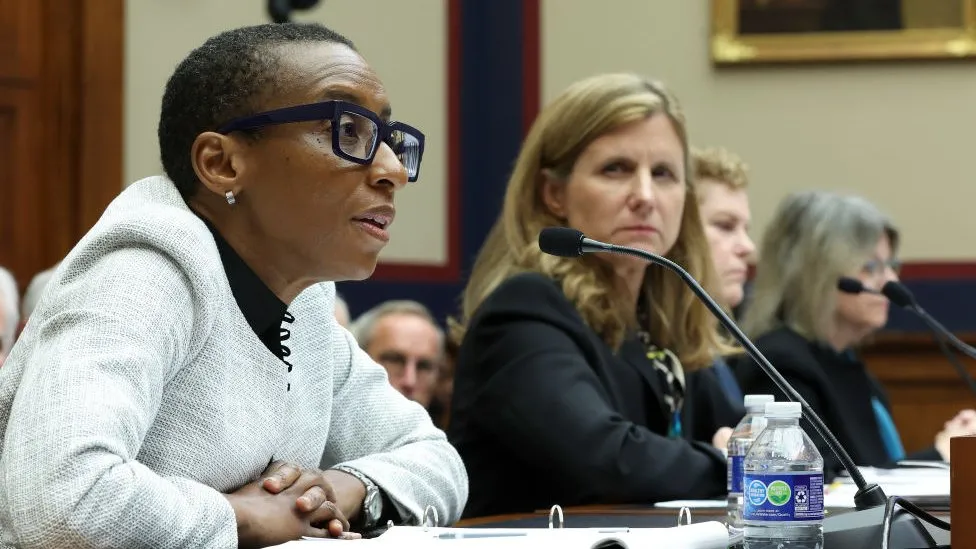Claudine Gay: Harvard president won't lose job over Congress row
Harvard University says its president, Claudine Gay, will keep her job despite mounting controversy over her appearance before Congress last week.

Dr Gay was facing pressure to step down after she failed to say whether students calling for the genocide of Jewish people would be disciplined.
But in a letter over the weekend nearly 700 staff members rallied behind her.
In a statement on Tuesday, the school's board said it was "reaffirm[ing] our support" for her leadership.
"Our extensive deliberations affirm our confidence that President Gay is the right leader to help our community heal and to address the very serious societal issues we are facing," said the Harvard Corporation, the highest governing board at the university.
"In this tumultuous and difficult time, we unanimously stand in support of President Gay," the 13-member board added.
The news Dr Gay will remain as president comes just days after the head of the University of Pennsylvania (UPenn), Elizabeth Magill, said she would resign after facing a similar backlash over her own congressional testimony.
Dr Gay testified alongside Ms Magill and Massachusetts Institute of Technology president Sally Kornbluth at a House of Representatives hearing on antisemitism last week.
During tense questioning from Republican Congresswoman Elise Stefanik, Dr Gay said she believed calls for the genocide of Jews were abhorrent, but said whether it would constitute a violation of Harvard's code of conduct regarding bullying and harassment depended on the context.
In an interview with Harvard's campus newspaper, the Crimson, shortly after, she apologised.
"When words amplify distress and pain, I don't know how you could feel anything but regret," she said.
In its statement, the Harvard Corporation said calls for genocide were "despicable" and added that Dr Gay's initial statement "should have been an immediate, direct, and unequivocal condemnation".
But the school noted Harvard's president had apologised for how she handled her testimony before Congress.
"Harvard's mission is advancing knowledge, research, and discovery that will help address deep societal issues and promote constructive discourse, and we are confident that President Gay will lead Harvard forward toward accomplishing this vital work," the board said.
Nearly 700 faculty members signed a petition over the weekend asking Harvard to "resist political pressures that are at odds with Harvard's commitment to academic freedom" and keep Dr Gay as president.
One signatory, Harvard Professor Alison Frank Johnson, told the BBC's Newshour programme that Dr Gay had given a "catastrophic set of answers" at the hearing, but said the "question of university autonomy" drove her and others to sign the petition supporting the president.
"I think it was a catastrophic set of answers that didn't do justice to her or to our university and I don't want to defend them. But I don't think they actually reveal a moral degeneracy on the part of the Presidency or the university leadership that requires that she should be fired" she said.
But StopAntisemitism, a non-profit focused on combatting discrimination against Jewish people, lambasted the Harvard Corporation for "failing to hold" Dr Gay accountable.
"The Corporation's decision serves only to greenlight more Jew-hatred on campus," the group said. "StopAntisemitism continues to call for President Gay's resignation and urges the Corporation to reconsider its decision and hire someone who is committed to protecting every Harvard student."
Meanwhile, more than 70 lawmakers, mostly Republicans, had called on Dr Gay to resign, claiming university president's answers at the hearing were "abhorrent".
In the wake of the war in Gaza, college campuses across the US have emerged as the sites of frequent pro-Palestinian or pro-Israeli protests, raising concerns about both Islamophobia and antisemitism.
Appointed in July, Dr Gay is Harvard University's first black president in its 368-year history. The daughter of Haitian immigrants, she earned a degree in economics from Stanford University, where she once taught.
Dr Gay went on to obtain a PhD in government from Harvard, where she began teaching African and African-American Studies in 2007.
While Dr Gay quickly received significant backing, Elizabeth Magill came under fierce external pressure to resign.
The UPenn president announced her decision to resign from the University of Pennsylvania shortly after a major university donor withdrew a $100m (£80m) grant in protest over her comments.
She had faced a backlash before her congressional testimony, including from some of the school's wealthiest donors, who argued she had not issued a swift and strong enough rebuke of the Hamas attacks.
Molly McPherson, a crisis management strategist, told the BBC that larger dynamics at their two universities also explain why one president is still standing and the other has resigned.
"Each institution has their own set of values, their own donors and donor expectations," she said. "Harvard was ready to support Gay, and UPenn was ready to let Magill go."
But she added that the way Ms Magill chose to respond to the backlash over her testimony likely did not help. While Dr Gay went directly to the student body through the school newspaper, Ms Magill issued an apology video that appeared "awkward, stilted, unrehearsed and scripted", she said.
The video "lacked all authenticity and seemed removed from what the real problem was, and that is the disconnection between her views and the protection of the students", Ms McPherson said.
Dr Gay's response stood in stark contrast, she said. "Her remarks were relatable," she said. "She chose a proactive approach."
-bbc







